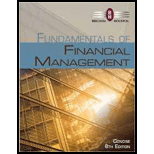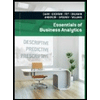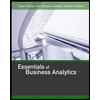
Concept explainers
The required
Want to see the full answer?
Check out a sample textbook solution
Chapter 9 Solutions
Bundle: Fundamentals of Financial Management, Concise Edition (with Thomson ONE - Business School Edition 6-Month Printed Access Card), 8th + Aplia Printed Access Card
- Gentherm Incorporated has a convertible bond issue outstanding. Each bond, with a face value of $1,000, can be converted into common shares at a rate of 42.25 shares of stock per $1,000 face value bond (the conversion rate), or $19.85 per share. Gentherm’s common stock is trading (on the NYSE) at $19.85 per share and the bonds are trading at $1,025. Calculate the conversion value of each bond. Note: Round your answer to 4 decimal placesarrow_forwardYou are looking to lease a 2019 Subaru Forester. You have found a 36 - month closed end lease on a Forester with an MSRP of $25, 270 and a lease end purchase option of $15,667 (residual value). To get the lease you have to pay a fee of $1,765 due at signing, and the monthly payment was calculated to be $ 265. A) What is the nominal rate of return the dealership is earning on the lease? (Hint: think of the cash flows from the dealerships prospective) B) What would the lease payment be if the dealership wanted a nominal 6% compounded monthly on the lease?arrow_forwardWhat should business people learn about the problem started with Sears and organizational consequences?How the traditional retail businesses face significant challenges in remaining competitive in the digital age? What is the broad exploration of retail industry challenges without assuming specific causes or outcomes, making them suitable for research and why?arrow_forward
- What are Biblical principles researchers can follow to mitigate Unintended errors in research?How a Christian conduct during a research proposal and study can be a witnessof the Gospel to others.arrow_forwardWhat is Sears business problem? What cause Sears to collapse and closeout the company? Would you please help to explain, what is the problem statement, and general problem? Could you help to provide four research questions that align with the problem statement, ensuring they are exploratory, not assumptive, and not specific to an organization.arrow_forwardHilton Hotels Corporation has a convertible bond issue outstanding. Each bond, with a face value of $1,000, can be converted into common shares at a rate of 61.2983 shares of stock per $1,000 face value bond (the conversion rate), or $16.316 per share. Hilton’s common stock is trading (on the NYSE) at $15.90 per share and the bonds are trading at $975. a. Calculate the conversion value of each bond. (Round your answer to 2 decimal places. (e.g., 32.16)). (974.50 was wrong)arrow_forward
- Consider an investor who, on January 1, 2022, purchases a TIPS bond with an original principal of $100,000, an 8 percent annual (or 4 percent semiannual) coupon rate, and 10 years to maturity. If the semiannual inflation rate during the first six months is 0.3 percent, calculate the principal amount used to determine the first coupon payment and the first coupon payment (paid on June 30, 2022). From your answer to part a, calculate the inflation-adjusted principal at the beginning of the second six months. Suppose that the semiannual inflation rate for the second six-month period is 1 percent. Calculate the inflation-adjusted principal at the end of the second six months (on December 31, 2022) and the coupon payment to the investor for the second six-month period.arrow_forwardA municipal bond you are considering as an investment currently pays a yield of 6.75 percent. Calculate the tax-equivalent yield if your marginal tax rate is 28 percent. Calculate the tax-equivalent yield if your marginal tax rate is 21 percent.arrow_forwardWhat would your assessment of the plight of the working poor? Explain.arrow_forward
- What is considered to be "living on the edge"? Explain.arrow_forwardHow close to the edge are the working poor living? Explain.arrow_forwardSuppose three countries’ per capita Gross Domestic Products (GDPs) are £1000, £2000, and £3000. What is the average of each pair of countries’ GDPs per capita? (b) What is the difference between each of the individual observations and the overall average? What is the sum of these differences? (c) Suppose instead of three countries, we had a sample of 100 countries with the same sample average GDP per capita as the overall average for the three observations above, with the standard deviation of these 100 observations being £1000. Form the 95% confidence interval for the population mean. (d) What might explain differences in GDP across countries? Consider the following regression equation, where Earnings is measured in £/hour, and Experience is measured in years in a particular job, with standard errors in parentheses: Earnings \ = −0.25 (−0.5) + 0.2 (0.1) Experience, One of these numbers has been reported incorrectly - it shouldn’t be negative. Which one and why? (b)…arrow_forward
 Essentials Of Business AnalyticsStatisticsISBN:9781285187273Author:Camm, Jeff.Publisher:Cengage Learning,
Essentials Of Business AnalyticsStatisticsISBN:9781285187273Author:Camm, Jeff.Publisher:Cengage Learning, Intermediate Financial Management (MindTap Course...FinanceISBN:9781337395083Author:Eugene F. Brigham, Phillip R. DavesPublisher:Cengage Learning
Intermediate Financial Management (MindTap Course...FinanceISBN:9781337395083Author:Eugene F. Brigham, Phillip R. DavesPublisher:Cengage Learning Essentials of Business Analytics (MindTap Course ...StatisticsISBN:9781305627734Author:Jeffrey D. Camm, James J. Cochran, Michael J. Fry, Jeffrey W. Ohlmann, David R. AndersonPublisher:Cengage Learning
Essentials of Business Analytics (MindTap Course ...StatisticsISBN:9781305627734Author:Jeffrey D. Camm, James J. Cochran, Michael J. Fry, Jeffrey W. Ohlmann, David R. AndersonPublisher:Cengage Learning


